Disclosure: Meeple Mountain received a free copy of this product in exchange for an honest, unbiased review. This review is not intended to be an endorsement.
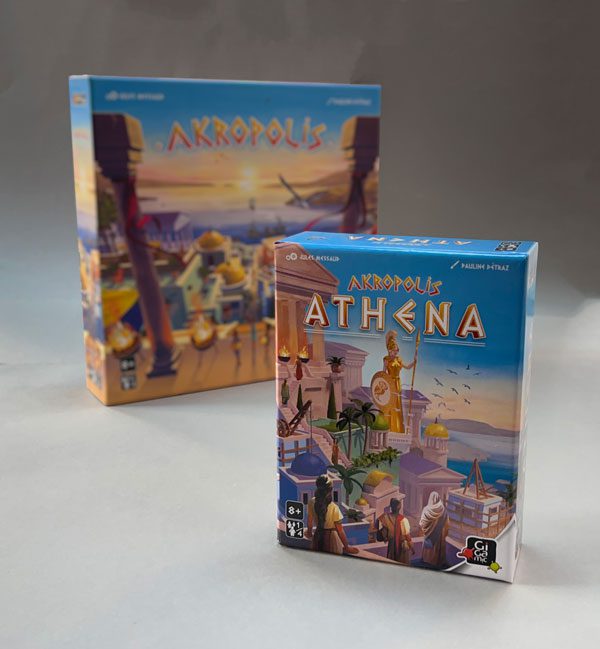
In the Summer of 2022 I reviewed Akropolis, from Gigamic. As a fan of tile-laying games, I had high hopes for the game—hopes that were not just realized, but surpassed. The unique scoring mechanism that encourages you to build upwards, placing tiles atop other tiles, made for interesting choices throughout each game my group played.
When the Akropolis: Athena expansion was announced, I was eager to give it a try. I’d been waiting for an excuse to get Akropolis back to the table, and this expansion was the perfect reason.
For this review, I’m going to assume you already know how to play the base game. If not, please read my review of Akropolis.
ακούστε τη φύση και μάθετε τη «Γλώσσα της Φύσης».
(Listen to Nature and Learn ‘Nature’s Language’)
The box for Akropolis: Athena is divided into three sections: one for the 30 single hex tiles, one for the segments of the Athena statue, and one with a series of 18 playing cards. Let’s set the expansion up on the table and see how they come together.
Divide the sections of the Athena statue into four piles: one for the heads, one for the torsos, one for the shields, and one for the feet. Each pile should have pieces equal to the number of players.
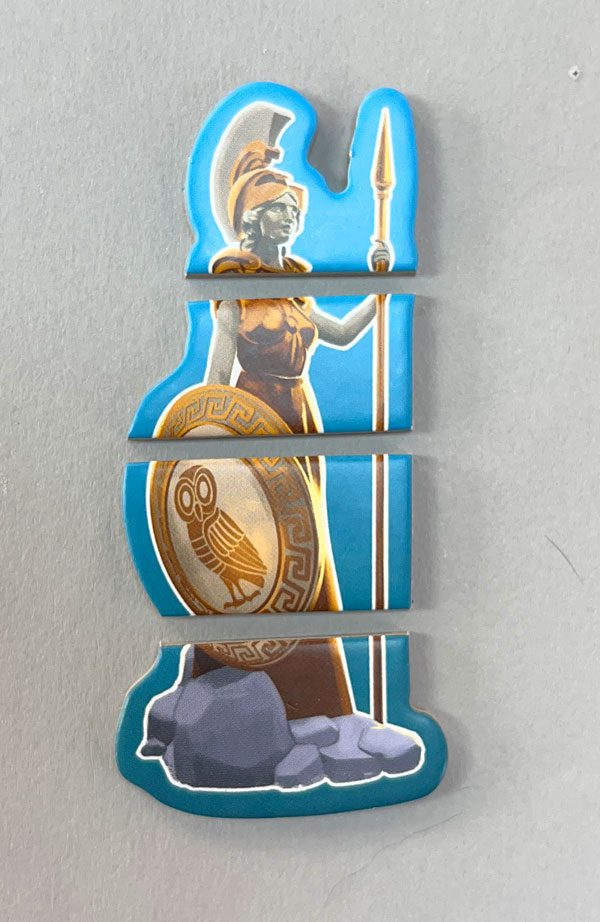
Place the single hexes face down and perform a blind draw, one hex per player, to be placed under each of the statue sections.
Finally, shuffle the cards and draw four, placing each above one section of the Athena statue.
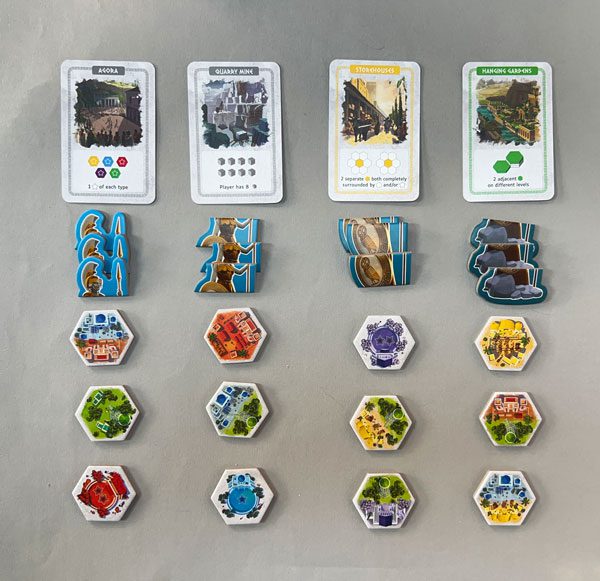
Now you’re ready to add Akropolis: Athena to the base game.
Υπάρχουν περισσότερα στη ζωή από την ομορφι
(There is More to Life Than Beauty)
When adding the Akropolis: Athena expansion, nothing about the base game changes. The standard placement and scoring rules all still apply.
So, what do the four columns of the expansion add to the game?
The card at the top of each column of the expansion sets the conditions for the items below it. Conditions range from having certain Pavilions on specific levels, having specific Pavilions in a set pattern or in relation to other Pavilions, etc.
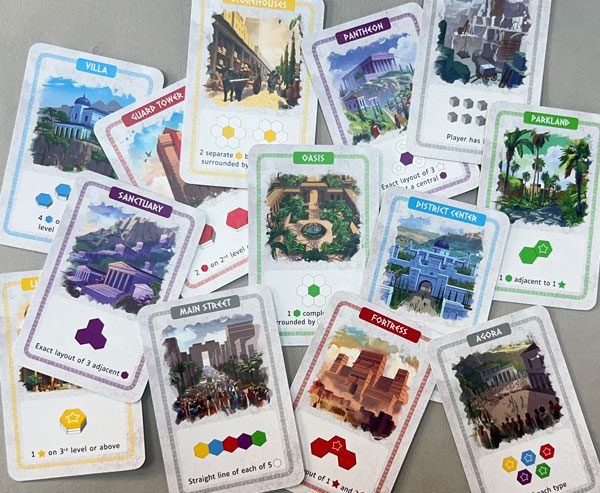
If you match the criterion of a card, you’ll take the section of the Athena statue below it as a reward. Along with that, you’ll also choose one of the single hex pieces under the statue segments. Some of these hexes show a single Pavilion, while others show a split hex—half one type of Pavilion and half another. You’ll place this single hex into your tableau of tiles wherever you choose.

Other than adding some very nice single tiles to your personal Akropolis-in-progress, there’s another major change the expansion brings. In the standard game, any bricks you have at the end of the game score you +1 point. If you collect all four sections of the Athena statue, your remaining bricks will be worth +5 points for you at the end of the game.
Όταν το εμπόδιο γίνεται το μονοπάτι
(When the Obstacle Becomes the Path)
When scoring the base game of Akropolis, total the number of each building type (Markets, Gardens, Barracks, Housing, and Temples) and multiply that by the number of stars you have on all your matching Pavilions. The twist is you count any building on the table (e.g., the first level) once. If you place a building tile on top of those tiles, they’re on the second level and you count them twice. Have a building on the third level and it’s counted three times.
Looking for those upward building opportunities is an important scoring strategy in the base game. Akropolis: Athena changes this.
While upward expansion still brings in more points than a flat, personal Akropolis, the 5x increase in points per brick earned by completing the Athena statue is a fundamental change. As soon as one player starts collecting statue sections, it becomes very difficult to win without following suit. Through careful planning, it’s easy to end your game with 6-8 bricks. That’s an extra 30-40 points on top of what your buildings and Pavilions score.
In a recent game, one of my weekly group members went in heavy on Barracks, Barrack Pavilions, and statue pieces. After completing his statue, his score was almost three times that of a player who built all on one level and did not complete the Athena statue.
Base Akropolis plays quickly. Many times I’ve been reviewing my placement options for the piece I just selected, only to find it’s already my turn again. To play Akropolis: Athena well requires more time between moves. You’re not only trying to build up, but you must do so while matching the patterns or specific tile placements shown on the cards.
For a relatively inexpensive expansion, there’s a lot of replayablility in this small box. The conditions on the cards for claiming a statue section are a mix of patterns and placements, while the single hexes are just as varied.
Είμαι διάσημος ανάμεσα στους θεούς για τη σοφία, πονηρές πονηριές επίσης
(I Am Famous Among the Gods for Wisdom, Cunning Wiles, Too)
When it comes to expansions, I always ask myself two questions:
Is it Essential?
Akropolis: Athena is good, but it’s not an essential expansion. The base game is a perfectly solid game as it is. While I appreciate the strategic challenges the expansion offers, it’s not something I see myself adding to Akropolis every time I bring it out.
Does It Add Something that Makes the Base Game Even Better?
My weekly gaming group was divided on Akropolis: Athena. The person who went after the statue pieces (and then hoarded bricks) liked the expansion. Another person wasn’t so impressed. He hadn’t played the base game in a long while and felt the expansion was a distraction.
I can see both points of view. Personally, I’m up for the challenge Akropolis: Athena presents, but I’m not sure I’ll be adding it to all my future games. I’ll continue to offer it as an option with my weekly gaming group, but I won’t include it when introducing Akropolis to new players. I worry for those people it might be an unnecessary point of confusion. Akropolis: Athena requires an additional focus that first-time players might, understandably, lack.
To sum things up, allow me to quote our man, Justin Bell, who wrote this in his Quick Peaks mini-review of the expansion:
I wouldn’t call Athena essential, but it is a very nice addition to a solid, family-weight city building game.
That about sums it up, alright.


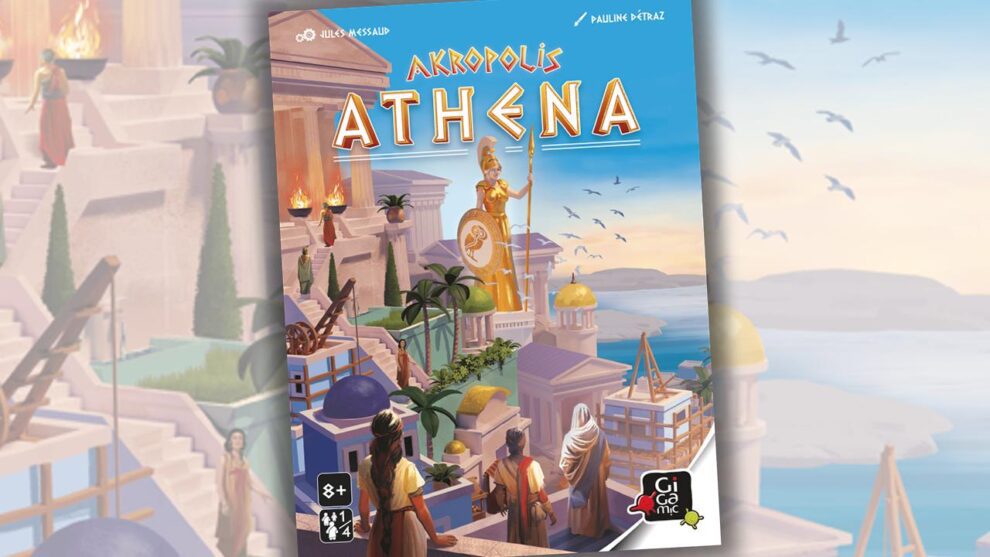









Add Comment